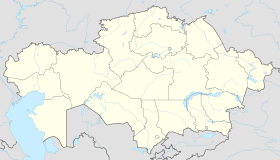Aqtau
|
Aktau Ақтау (Kazakh) Актау (Russian) |
||
|---|---|---|
| City | ||
|
||
| Location in Kazakhstan | ||
| Coordinates: 43°39′N 51°09′E / 43.650°N 51.150°ECoordinates: 43°39′N 51°09′E / 43.650°N 51.150°E | ||
| Country | Kazakhstan | |
| Region | Mangystau Region | |
| Founded | 1958 | |
| Government | ||
| • Akim (mayor) | Yedil Terekbayuly Zhanburshin | |
| Area | ||
| • Total | 140 km2 (50 sq mi) | |
| Elevation | -8 m (−26 ft) | |
| Population (2012) | ||
| • Total | 178,187 | |
| • Density | 1,300/km2 (3,300/sq mi) | |
| Time zone | UTC+5 (UTC+5) | |
| Postal code | 130000 | |
| Area code(s) | +7 7292 | |
| Vehicle registration | 12, R | |
| Website | aktau |
|
Aktau (Kazakh: Ақтау, Aqtaw) is a city in Kazakhstan, located on the east bank of the Caspian Sea. Its current name means "white mountain" in Kazakh, which may be due to its cliffs that overlook the Caspian. From 1964 to 1991 city was known as Shevchenko (Russian: Шевченко). Its former name was given due to the eponymous Ukrainian poet's period of exile in the area. It is located on the Mangyshlak Peninsula and is the capital of Mangystau Region.
Aktau is known for its unique block address system. Almost all streets inside the city have no names, and addresses in Aktau generally consist of three numbers: the district number (also known as micro-region/micro-district/block), the building number, and the apartment number. This is because Aktau was originally planned as a camp for the workers of the oil industry.
The territory of what is now Aktau was once inhabited by ancient tribes of Scythians. Archeological finds in the area include old settlements and utensils. The current territory of Mangystau hosted a spur route of the northern silk road, which resulted in the founding of several Sufi shrines in Aktau's vicinity. However, the area had very little population prior to Soviet times and no cities of any relevancy, almost certainly due to the scarcity of fresh water.
In 1958, uranium prospectors settled the site of modern Aktau, naming the settlement Melovoye (Меловое) after the bay on which it stood. After the development of the uranium deposits was started, the settlement was closed and renamed Guryev-20 (Гурьев-20). In 1963, its closed status was lifted, town status was granted, and the name was changed to Aktau. However, in 1964 it was given yet another name, Shevchenko (Шевченко), to honor the Ukrainian poet Taras Shevchenko who spent 1850–1857 in political exile in Novopetrovskoye, about 100 kilometers (62 mi) to the northwest. This Ukrainian name for the city may have been granted due to the large number of Ukrainian workers who settled in the city. Their descendants are easily identifiable to this day by surnames ending in '-enko'. After the dissolution of the Soviet Union and Kazakhstan gaining independence, the name Aktau was restored in 1991, but the city's airport still retains SCO as its IATA code.
...
Wikipedia


